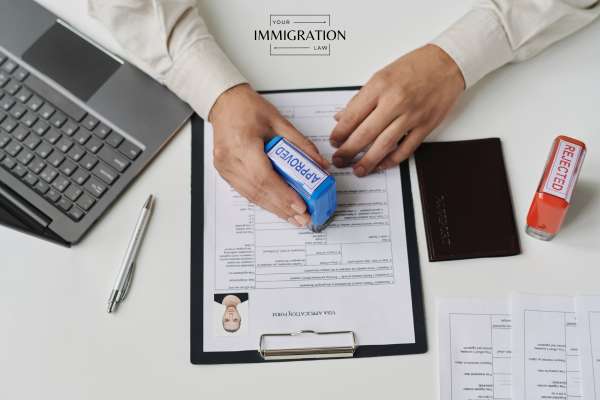Navigating the U.S. immigration system can be complex, especially when it comes to employment visas. These visas allow foreign workers to work in the United States and are vital for companies seeking to fill specialized positions.
In this guide, we will explore the different types of employment-based visas, eligibility criteria, the application process, common challenges, and the benefits of hiring an employment visa lawyer.
If you're seeking to work in the U.S., don't navigate the employment-based visa process alone. We offer free consultations, call our law firm at 313-631-8080 to take the first step toward achieving your career goals in the U.S.
Common Types of Employment Visas
Employment visas come in various types, each designed for different work scenarios and qualifications. Knowing the category of visa you need helps ensure you meet the necessary eligibility requirements:
H-1B Visa: Specialty Occupations
The H-1B visa is designed for individuals in specialty occupations that typically require a bachelor’s degree or higher in a specific field. This visa is particularly popular among professionals in technology, engineering, healthcare, and finance.
To qualify for H1b status, employers must demonstrate that the position requires specialized knowledge and that the applicant possesses the necessary qualifications. For many skilled professionals, becoming an H-1B visa holder is a pathway to fulfilling their career aspirations in the U.S.
This visa is crucial for those looking to contribute to industries that rely on specialized skills.
H-2A Visa:
The H-2A visa is designed for foreign nationals who come to the U.S. to perform temporary or seasonal agricultural work. This temporary visa is typically issued for up to one year, with potential extensions depending on the work's seasonality and duration. Employers must demonstrate a lack of available U.S. workers for the job.

To qualify for an H-2A visa, you must have a job offer from a U.S. employer for temporary or seasonal agricultural work. Your prospective employer must file an immigrant petition for alien workers, demonstrating a need for foreign employees and that there are no qualified U.S. workers available for the position. The work must be seasonal or temporary in nature, typically related to agriculture.
H-2B Visa:
The H-2B visa is for non-agricultural temporary or seasonal workers. This visa is used for industries such as hospitality, construction, and landscaping. Like the H-2A, it is generally granted for up to one year, with possible extensions based on the nature of the work.
For the H-2B visa, you need to secure a job offer for temporary or seasonal non-agricultural work, such as in hospitality or construction. Your employer must prove that there are no qualified U.S. workers available for the position and that the job is not permanent, aligning with the H-2B visa’s focus on temporary employment.
EB-1 Visa: Extraordinary Ability and Multinational Managers
The EB-1 is a permanent work visa and is reserved for individuals with extraordinary ability in their field. This can include outstanding professors, renowned scientists, accomplished artists, and exceptional athletes.
Additionally, it covers multinational managers and executives who have worked for a foreign company and are seeking to continue their employment in the U.S. Applicants must provide substantial evidence of their accomplishments and significant contributions to their field, showcasing their exceptional abilities.
This immigrant visa category is highly sought after as it can lead to permanent residency and a green card for those who qualify.
EB-2 Visa: Advanced Degree Holders and Exceptional Ability
The EB-2 visa targets professional workers holding advanced degrees, such as master's or doctoral degrees, or those with exceptional abilities in their field. This visa is ideal for foreign nationals with advanced training or expertise, allowing them to contribute their skills to the U.S. workforce.
Qualified applicants must have a job offer from a U.S. employer and meet specific educational requirements. Getting an EB-2 visa also permits a National Interest Waiver (NIW), allowing some individuals to bypass the job offer requirement if they can demonstrate that their work benefits the United States.
EB-3 Visa: Skilled Workers, Professionals, and Unskilled Workers
The EB-3 visa is for a mix of foreign workers. It includes skilled workers with at least two years of experience. It also includes professionals with a bachelor's degree and unskilled workers for jobs needing less than two years of training.
This visa allows diverse individuals to work in the U.S. It is vital to Employment-Based Immigration. It lets employers hire foreign workers for jobs that might go unfilled.
The EB-3 category visa is one of the primary employment-based green cards available to foreign nationals.
EB-5 Visas: Investor Immigration
The EB-5 visa is tailored for investors from foreign countries who put a significant amount of capital into a U.S. business. This investment must create or preserve at least ten full-time jobs for U.S. workers, making it a win-win for both the investor and the local economy.
The EB-5 program is attractive for those looking to gain a green card while contributing to the U.S. economy. Foreign workers can secure their U.S. future by investing in new or troubled businesses. This is a unique visa opportunity.
L-1A Visa
The L-1A visa allows multinational companies to transfer executives or managers from a foreign office to a U.S. office. It’s commonly used for those setting up new operations or overseeing key business functions. To qualify, the employee must have worked for the company abroad for at least one continuous year within the past three years.
The L-1A visa is valid for up to seven years, depending on whether the employee is opening a new office or joining an existing one. It also offers a potential path to permanent residency for eligible applicants.
O-1 Visa:
The O1 visa is for individuals with extraordinary ability or achievement in their field, such as arts, sciences, business, or athletics. To qualify for the O-1 visa, you must prove extraordinary ability or achievement in your field through evidence such as awards, critical reviews, or significant accomplishments.
This visa is available to individuals in the arts, sciences, business, or athletics who have demonstrated a high level of recognition and success.
P Visas:
A P visa allows internationally recognized athletes, entertainers, and cultural performers to come to the U.S. for specific events, competitions, or performances. The P-1 visa is for athletes or members of entertainment groups, while the P-2 visa covers individuals in reciprocal exchange programs. The P-3 visa is designed for those performing in culturally unique events.

These visas are typically issued for the duration of the event or tour but can be extended as needed. Dependents of P visa holders can accompany them under a P-4 visa, allowing family members to stay in the U.S. during the performance period.
R-1 Visa: Religious Workers
The Religious Worker or R-1 visa is specifically for foreign workers coming to the U.S. to work in a religious capacity. This visa allows work in various religious organizations, like churches and synagogues.
This visa can help foreign workers in religious roles. It is vital for many U.S. faith-based communities.
R-1 visa holders must be employed by a qualified religious organization and prove that they have been a member of the religious denomination for at least two years prior to applying. The visa is intended for ministers and individuals in religious occupations, including administrative roles within religious organizations.
Eligibility Criteria for Employment Visas
Eligibility criteria for employment-based visas vary depending on the specific type of visa. However, general requirements typically include:
- Job Offer: Most visas for prospective employees require applicants to have a job offer from a U.S. employer. This ensures that there is a position available for the foreign worker.
- Specialized Skills: Many visas require the applicant to possess specialized skills or qualifications relevant to the job. This is especially true for positions in fields like technology, healthcare, and engineering.
- Education Requirements: Certain visas mandate specific educational credentials, such as an advanced degree. For example, the EB-2 visa requires an advanced degree or exceptional abilities in the field.
In addition, Labor Condition Applications (LCA) and PERM labor certification are crucial for some visa categories, particularly for H-1B and EB-3 visas. The LCA checks that hiring foreign workers won't harm U.S. workers. It does this by ensuring the employer will pay the prevailing wage. Meanwhile, the PERM process helps employers show a need for foreign labor. It does this by testing the labor market.
The Employment Visa Application Process
The employment immigration application process has several critical steps. They range from checking eligibility to submitting required documents like the I-140 petition. Knowing these steps can help you navigate the complex process more efficiently:
Gathering Necessary Documentation
The first step in the employment visa application process is to gather all necessary documentation. This typically includes proof of employment, educational credentials, and any required forms specific to the visa category.
Applicants should diligently collect documents. These include diplomas, transcripts, letters of employment, and any relevant professional licenses.
Filing the Application
Once documentation is complete, the employer must file the application forms with the U.S. Citizenship and Immigration Services (USCIS). This step includes submitting the LCA for H-1B visas or the PERM application for EB-2 and EB-3 visas.
Employers must ensure that all forms are accurately completed and that they meet the required deadlines to avoid delays in processing.
Responding to Requests for Evidence
USCIS may issue Requests for Evidence (RFE) during the application process. This is if it needs more information or documents. It is crucial for applicants to respond promptly and accurately to these requests to avoid delays or potential denials.
This may involve getting more documents or clarifying points about the applicant's qualifications or work history.
Common Employment Visa Challenges
Securing an employment-based immigrant visa can be challenging. You must meet specific requirements and handle complex paperwork. Identifying these common issues can help you prepare better:
Changing Employers
One common challenge for foreign workers is changing employers. If a visa holder wishes to switch jobs, the new employer must file a new petition for the worker.

This process can complicate things. It may require the employee to leave the U.S. while waiting for approval. This can be stressful and disruptive.
Visa Extensions and Renewals
Nonimmigrant visa holders often need to extend or renew their status, which can be complicated. Each visa type has specific requirements for extensions, and failing to meet these can jeopardize legal resident status.
Applicants should be aware of their visa expiration dates and start the renewal process well in advance to avoid lapses in status.
Dealing with Visa Denials
Visa denials can be disheartening. They may occur for various reasons. These include insufficient documentation or failure to meet eligibility criteria. Understanding the grounds for denial is crucial for reapplying or appealing the decision. Applicants should review their case and consult an immigration appeals attorney for solutions.
Benefits of Hiring an Employment Visa Lawyer
An employment visa lawyer can help you. They can navigate complex rules and ensure your application is error-free. They can help you through:
- Ensuring Compliance with Immigration Laws: Employment visa lawyers know U.S. immigration laws. They ensure employers and applicants meet all legal requirements. They can help prevent issues that may arise from misunderstanding complex regulations.
- Minimizing Application Errors and Delays: Experienced lawyers can spot potential issues before they arise. This minimizes errors that could delay the application process. They can review applications and documents to ensure accuracy. This reduces the chance of Requests for Evidence.
- Tailored Strategies for Complex Cases: For unique or complex cases, a lawyer can create a custom strategy. This will navigate specific challenges and ensure the best chance of success. Legal support can make a big difference. It helps with complex employer changes and denials.
Selecting the Right Employment Visa Lawyer
Choosing the right employment immigration attorney is crucial for a smooth application process. The right lawyer will know how to handle the nuances of your specific case and guide you through each step effectively:
- Qualifications and Experience: When choosing an employment visa lawyer, check their qualifications and track record in this field. Find experienced immigration attorneys with a strong record in employment-based visa cases.
- Focused on Employment Immigration: Look for dedicated attorneys who exclusively practice in or prioritize immigration. A lawyer focused on employment-based visas will know the visa requirements and processes for each type.
- Client Reviews and Success Rates: Research client reviews and success rates to gauge the lawyer’s effectiveness in handling employment visa cases. Positive testimonials and a high success rate can reassure you. They suggest you choose the right employment visa attorney for your needs.
Maintaining Legal Status with an Employment Visa
It's vital to keep your employment visa to comply with immigration laws. Your visa requirements and responsibilities will help you keep your status and avoid issues.
Adhering to Visa Conditions
Visa holders must follow their visa's conditions. This includes working for the employer sponsor and keeping valid documents. Violating these conditions can result in losing legal status and being required to leave the U.S.
Reporting Changes in Employment
Any changes in employment, such as a new job or a change in job title, must be reported to USCIS to ensure compliance. Keeping USCIS informed helps maintain the validity of the visa and prevents any potential issues.
Planning for Visa Expiration
It’s crucial for visa holders to plan ahead for their visa expiration. Understanding renewal processes and timelines can help avoid lapses in legal status. Visa holders should keep track of their expiration dates and start the renewal process early.
Need Help with Your Employment-Based Visa? Contact Us Today
Employment immigration visas are a crucial step for foreign workers looking to build their careers in the U.S. Both employers and employees need a solid understanding of the different types of employment visas, who are eligible, and how the application process works.
Working with an experienced immigration lawyer can make all the difference. We can help you navigate the adjustment of status process, stay compliant with immigration laws, and improve your chances of securing permanent residence. Whether you're an employer or a foreign worker, being well-prepared is the key to a smooth and successful visa application.